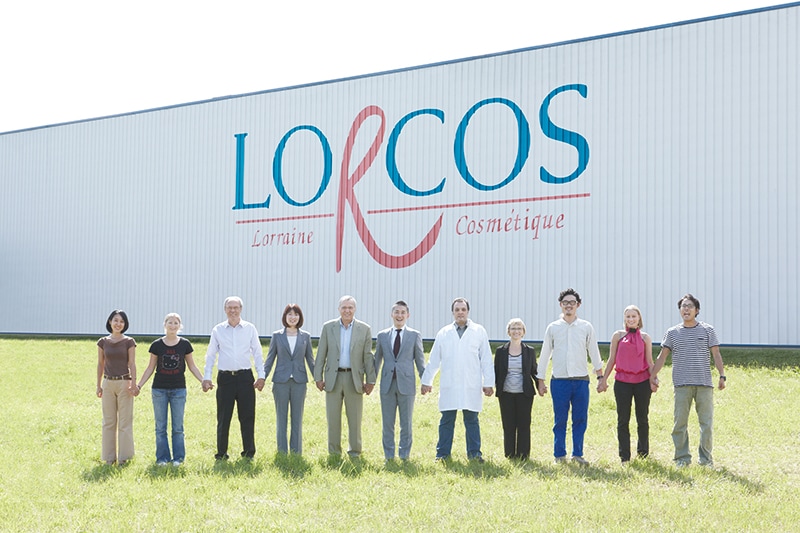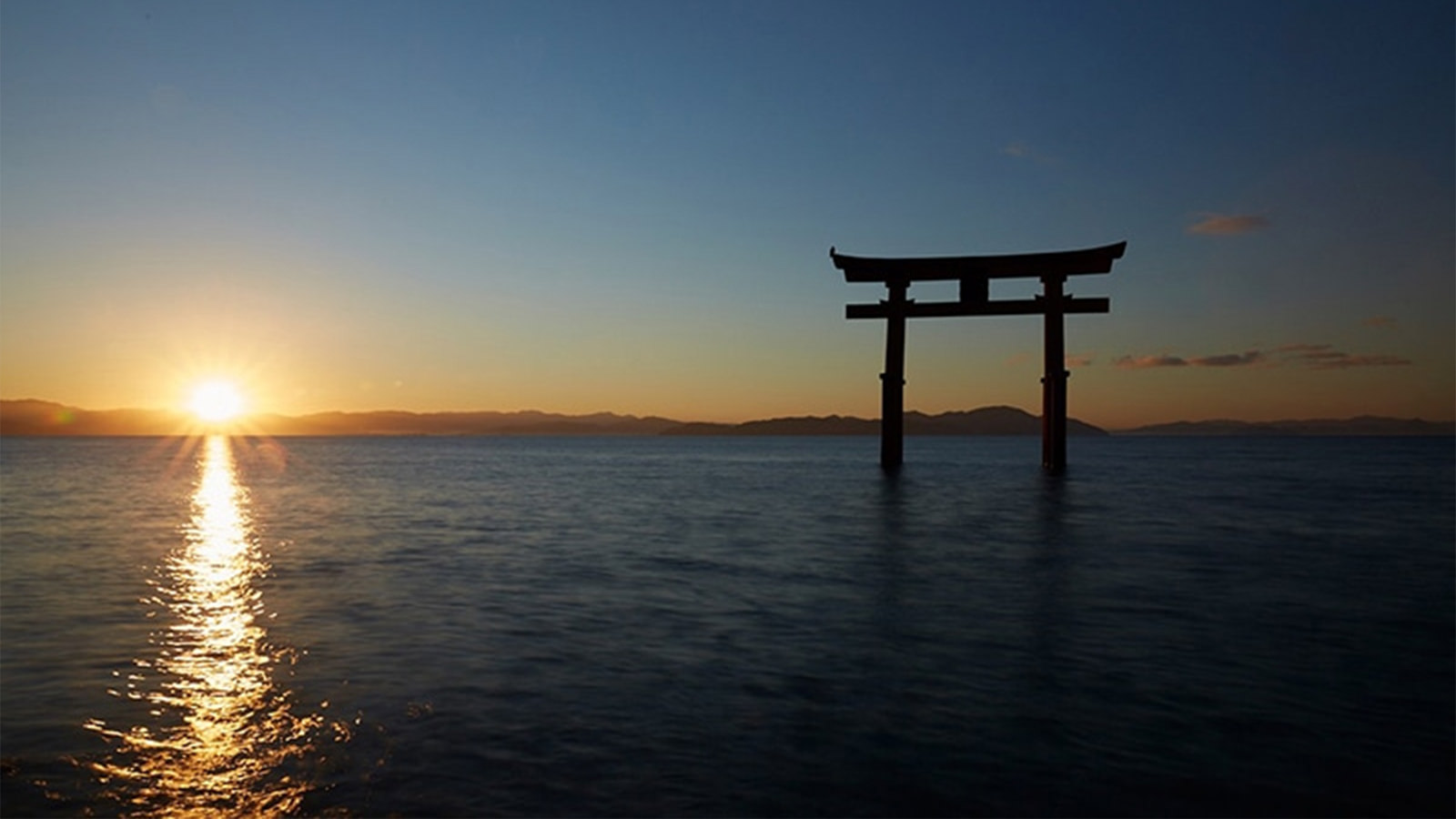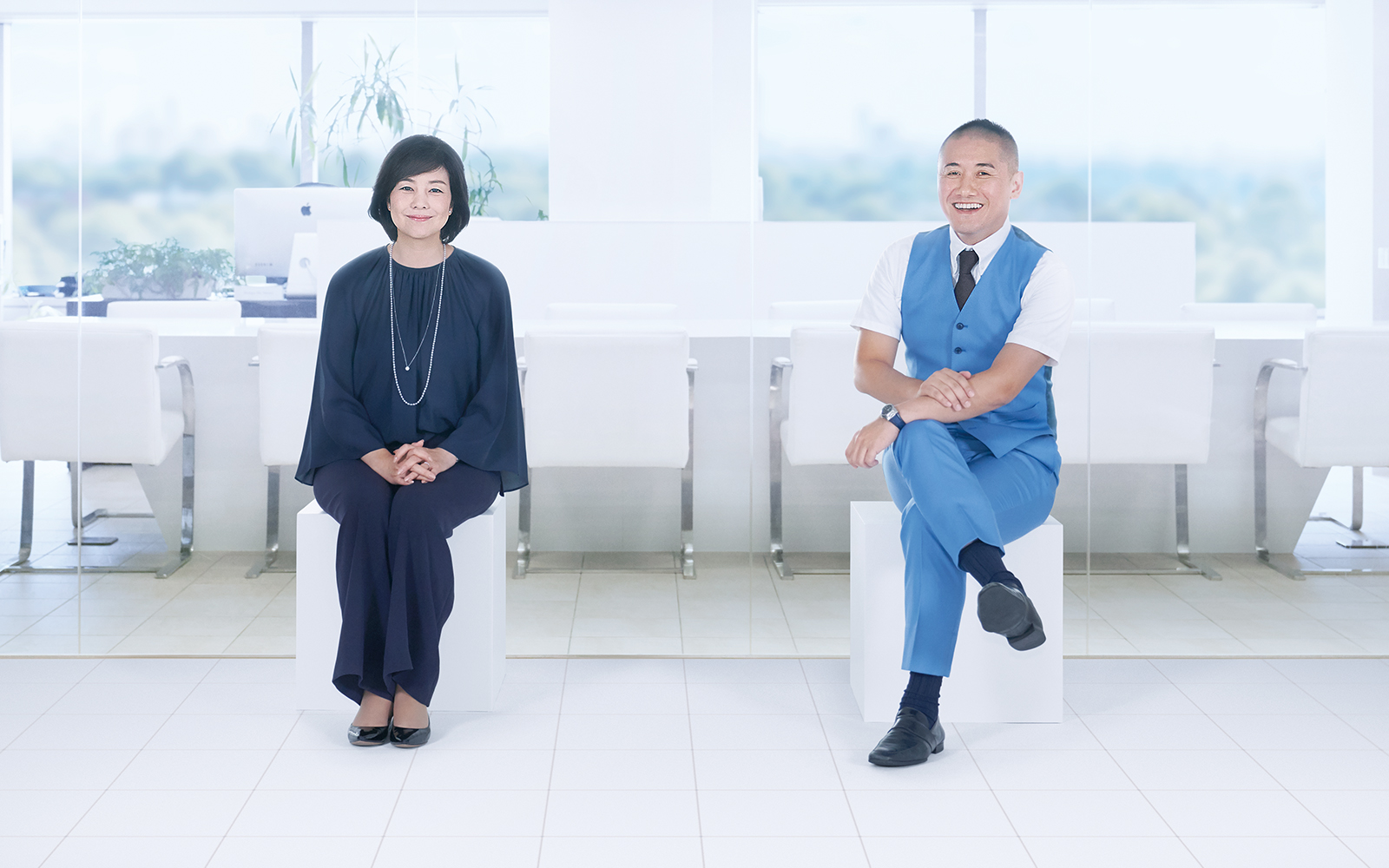
WHAT JBIG? WHY JBIG?
Minako Suematsu, President of The Japan Times, and Taihei Noda of P.G.C.D. JAPAN talked about "JBIG".
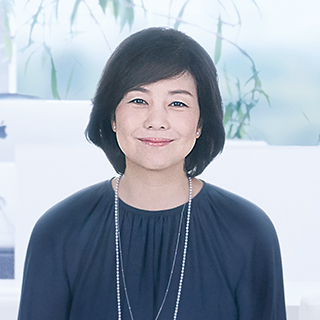
Representative Director of News to You Holdings Co., Ltd.
Representative Director and Chairman of Japan Times Co., Ltd.
Yanako Suematsu
Starting from the early days of the Internet, he has been active in a wide range of fields, including launching an Internet-based PR business, running the “Satoyama Promotion Consortium” that disseminates Japan's satoyama widely, and establishing an international school in the rich nature of Hiroshima.
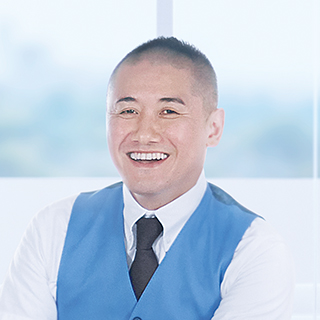
CEO of JBI Group Inc.
CEO of P.G.C.D Japan Co., Ltd.
Taihei Noda
Born in Fukuoka Prefecture in 1979. In 2010P.G.C.D. JAPAN is established. Develop and sell skin care and scalp care products to increase the number of people who change their age into beauty. In 2019, JBI GROUP, a holding company, was established. Under the corporate philosophy "Pay forward", we will create sustainable products and businesses with the mission of "increase the number of people who make the world happy" and contribute to society and the future.
2019 when P.G.C.D.JAPAN celebrated its 20th anniversary. The brand has been changed to a holding under the theme of "Japan Beauty Innovation" without changing any of the items or concepts, while inheriting everything as it is.
To celebrate this, Mr. Minako Suematsu, who works to promote ESG (Environment Social Governance) in the global entrepreneurial network "EO Tokyo" *, as well as warming friendship as managers, and Taihei Noda, P.G.C.D JAPAN CEO We planned a talk.
Suematsu is the president of News to You Holdings and chairman of the Japan Times, the oldest English newspaper in Japan. "As a female manager, of course, as a Japanese window open to the world, I was trying to send Japan out to the world, so I was paying attention to it before I actually saw it," says Noda. On the other hand, Ms. Suematsu said, "At first I was shocked to hear the thought of Noda's products. It was a person born in the 20th century who runs the company with the ideal form and idealism. I feel it. " Ms. Suematsu, as a senior in management of Holdings, as a female manager with a deep knowledge of environmental issues, and as the head of the media that broadcasts Japan to the world at the Japan Times, how did this change in Holdings appear? The talk began with the start of each other's holdings, and the future of the company spread to what it should be, and it was nearly two hours of talks. I hope that this conversation will give you a feeling for our founding of JBIG.
<span>* [EO: Entrepreneurs’ Organization] A global entrepreneurial network founded in 1987. Currently, EO JAPAN, which is composed of more than 13,000 members in 58 countries, has 6 chapters and more than 500 members, and EO Tokyo is one of the largest branches in the world.</span>
Why did you make JBIG?
The purpose of Holdings is “sustainability”.

Taihei Noda (hereinafter Noda):Ms. Suematsu is a senior manager of Holdings management. Why did you decide to become a holding company?
Minako Suematsu (hereinafter Suematsu) : I first established the company during the early days of the Internet. I started with a good-natured theory, but fake news and stealth marketing appeared one after another, and it became a world like "I only have to make money", so I was very disappointed. The idea of long-term thinking, “What is the cause of this?” And “What is the cause of this?” Was holdings.
Noda:You didn't meet the Japan Times first.
Suematsu : Later. “News2u” has been a service that supports the information dissemination of companies, but since one company inevitably pursues the business in front of us, in order to think about the “clean, correct and beautiful” Internet It became a holding company. Why did Mr. Noda make “JBIG”?
Noda:In a nutshell, this is to make it a sustainable business. The average life expectancy of Japanese companies is now 23 years on average. With that in mind, I thought I needed to be a more sustainable company. There may be ups and downs as the business continues for a long time. The factory may be fired and unable to make products for half a year. At that time, it may not be possible to recover if there is only one business.
Suematsu:That's right.
Noda:It is very important for a company to be stable without being affected by social and economic conditions in order to deliver products to customers steadily in the future. When a group has something, several brands can help each other to see the effects. In architecture, it is not a seismic design that withstands shocks, but a seismic isolation design that spreads and receives shocks. So I think it is necessary to change flexibly while protecting the core and important things.
JBIG to keep the essence unchanged.
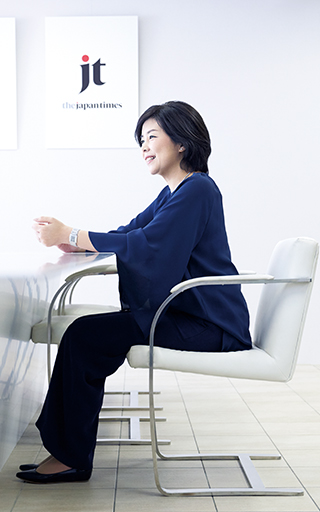
Noda: P.G.C.D. Is the news that Lake Biwa was once contaminated with domestic wastewater. The polluted water contained cosmetics, and I was questioned that "things that make people beautiful are polluting the earth." That's why we have been sticking to soap since our foundation. Soap does not require a container. No trash. You don't need to add extra things. By the way, how much do you think the average number of skin care items used by Japanese now? There are eight.
Suematsu:so much?
Noda:The amount of time spent using items continues to increase. I wondered why things continue to increase even though the world should be evolving.
Suematsu:So that's it.
Noda: Energy to make, energy to use, energy to throw away, energy to clean dirty water. Various things are under load. If that is the case, I think it would be better if there were few things. So we are aiming for "Pure Simplicity".
Suematsu : I don't think there are many companies that have succeeded with "theory that should be" and "awareness of problems". Isn't it a lot to change in order to sustain the company? It is important to keep pace with the times, but to keep the essence, I think it is necessary to create a holdings and think about the future.
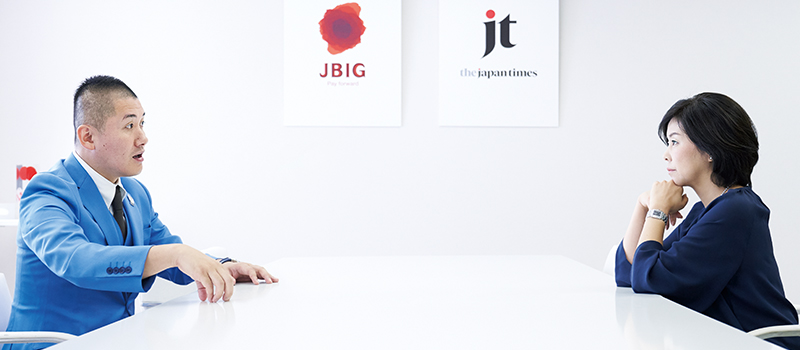
What is “Japan Beauty Innovation”?
The Japanese way of thinking becomes a property of mankind.
Suematsu: There is something called “Pure Simple” leading to the tea ceremony.
Noda:I think that the "beauty of Japan" that our holdings name "Japan Beauty Innovation" refers to is loneliness.Just as Japonisme once swept Europe and revolutionized art, the spread of values like wabi-sabi around the world will not solve the social issues that are now a problem all over the world. Kato.
Suematsu:Do you know GOKU-SABI?
Noda:GOKU-SABI?
Suematsu:Beyond WABI-SABI. The idea is that human beings are only one in the earth. I built a school in the nature of Hiroshima's Kamiishi Plateau, but children from the city are afraid that they can't sleep because they have insects. I'm saying "The insects are scared of you", but I think that this kind of sympathy is very important. There is no sense that "Otento-sama is watching" overseas. In Japan, God lives in all of the forests. In my daily life, I wonder if the sense of luxury and no waste comes from such a place. Because Japan is an island country, I have a sense of how to live sustainably with limited resources and supplies.
Noda:I think we can be more proud of the Japanese senses and values, and I think that the idea of “solitude” will be necessary in the future. If all human beings lived in the same way as Americans today, 4.5 Earth would be needed. However, I think that the situation can be improved further by living with Japanese values.
Suematsu:Japanese people are not good at transmitting such things. We set up the Japan Times Satoyama Promotion Consortium, which promotes Japanese satoyama capitalism to the world, but it is natural for satoyama people to say, "Why do I have to say such a thing?" It is surprising for those who do not know. But in everyday life, we can't objectively explain the value, so we objectively communicate it to the world. At the base is symbiosis with nature and with the earth. In this part, Japan may be more advanced. I'm working on thinking that it might be one of the ways of thinking and acting that might be a property of humanity.
Try to do more than you can.
Noda:Nowadays, Japanese companies are appealing their attitude to tackle environmental and social issues such as ESG and SDGs *, but I think it is different to say "let's do something good" outside of our main business.Unless the business in the middle itself solves social issues, the future business may be useless.
Suematsu:I think that Japan has taken the “three-way good” concept for granted. Now that Japanese values are finally being recognized in Europe and the United States, we have moved ahead with the creation of international rules and directions such as ESG and ADGss. If a Japanese does 10 out of 9, but does not do 1, he will say, "I'm not done yet." But in Europe and the United States, even if you have only one, if you are going to do 10, you say "I'll do 10." So it is very unfortunate that Japanese companies that are not good at sending out are labeled “I can't do anything”.
<span>* ESG / SDGs: ESG stands for Environment, Social, and Governance. The notion that these three perspectives are necessary for long-term growth of a company. The SDGs are the Sustainable Development Goals adopted by the 193 United Nations members at the 2015 United Nations Summit to achieve by 2030. It has 17 goals and 169 targets, calling on governments, businesses and civil society to act globally.</span>
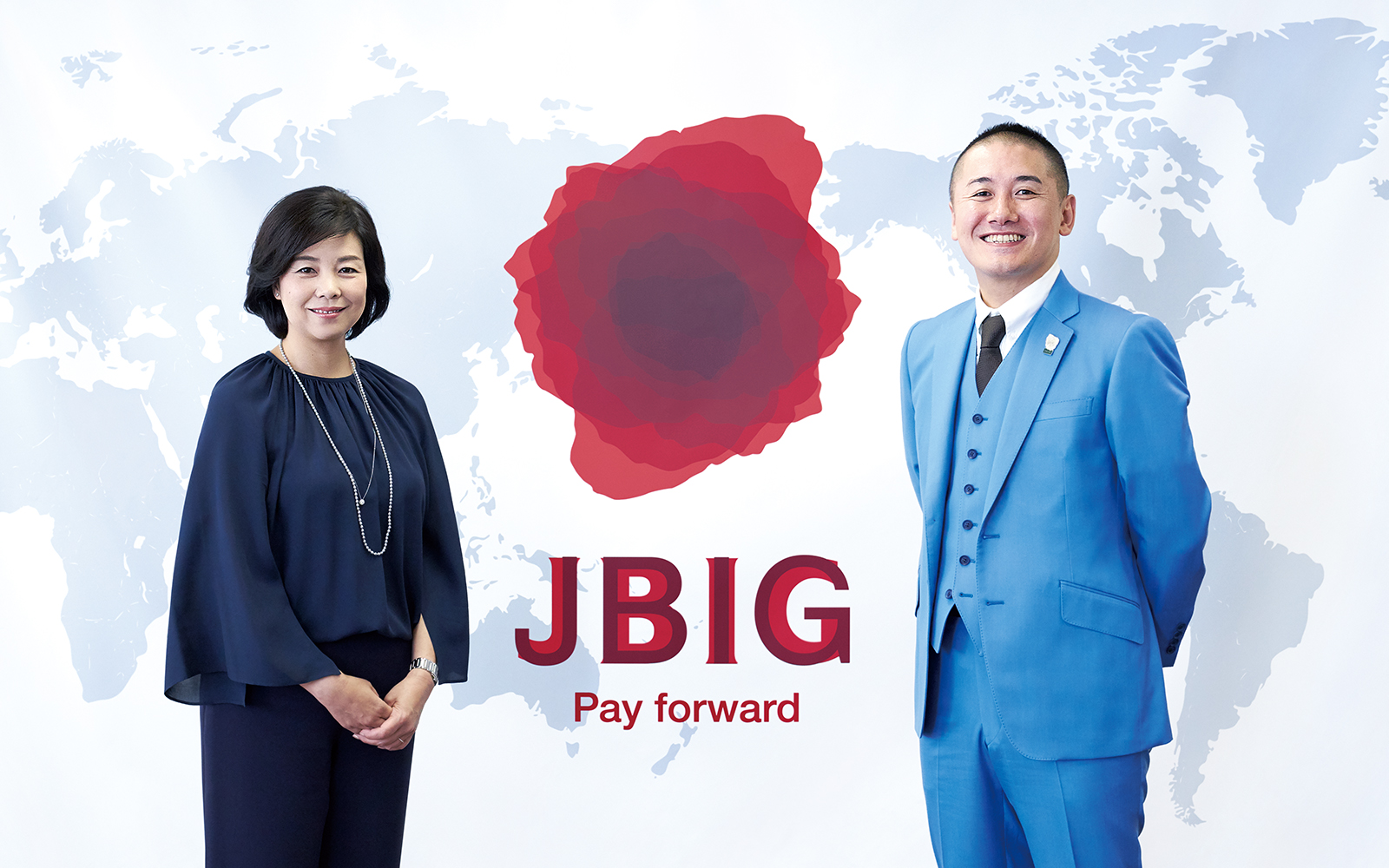
How will it change in the future?
“Pay forward” is “On-Okuri”
Noda:"Pay forward" is listed as the philosophy of "JBIG".A business that allows us to send the benefits we have inherited for the future, rather than paying back in the past.
Suematsu:It's a fortune. I send the benefit I received from someone to another person, who passes it on to another person, and passes on the benefits to the world.
Noda:That's right.
Suematsu:The idea of "On-Okuri" and "sympathy does not benefit people" has been established in Japan since ancient times.
Noda:Our business must not only make ourselves happy but also leave a good thing and a good environment for the next born. That's why our mission is to increase the number of people who make the world happy. If our customers make the world a better place, the impact will be greater. That's why I chose this word instead of "make the world happy."
Suematsu:It's wonderful!
Noda:Social responsibility is "beautiful for people and the earth." The result is "Pure Simplicity." Despite the technology has evolved this way, I want to put a step in the society where things continue to increase. I want to make what really survives and what is really high quality our achievements. Isn't it our job to create something that never existed before? So it took a lot of time to make things, and in fact, it took four years to make a shampoo with soap bars. If you don't stick to the essence, you can't do a sustainable business.
Suematsu:When you listen to Mr. Noda's story about product creation, you really feel the word "empathy."You are building a relationship in which you share values with customers through products.
The company is in an era where transparency is required.
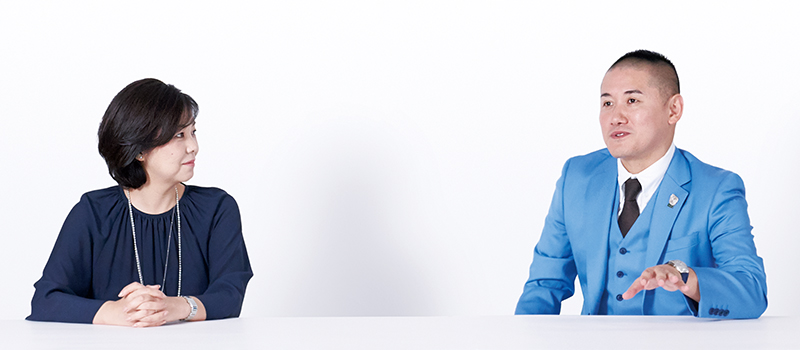
Suematsu:In the past, mass production, mass distribution, and mass consumption were thought to be correct, but this has changed the rules and said, "It used to be OK, but now it is useless." From now on, I think it is an era where you can do business based on the orthodoxy without any backlash. There was little transparency 50 years ago. But companies that can meet the expectations of our customers from now on, from where they are born to where they grow, to where they grow, aren't they?
Noda:As you can see, my office is glassed. When a customer comes in, you can see it and see it. I think it's bad for a brand owner who can't see the face. I would like to be able to feel what I'm thinking about making things just because of mail order, just like cooking in front of the restaurant's open kitchen.
Suematsu:Mr. Noda always feels that he is facing the orthodox. I think that there is a way to interact with the world that can be achieved by a new company, so I hope that you can continue to live as before.
Noda:Thank you!



